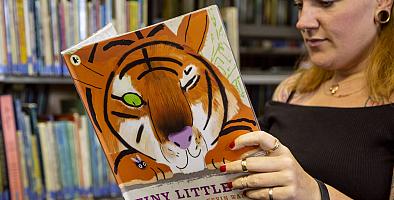MA
Literary Studies
Content navigation menu
Why study MA Literary Studies at Goldsmiths
This unique and intellectually rigorous Masters programme gives you the opportunity to study literature at an advanced level from a variety of perspectives.
- In your first term of study, you can select from and develop expertise in a range of literary areas, such as: Modern and Contemporary American Literature and Culture; Critical Theory; Modern and Contemporary Literature; Romantic, Victorian and Decadent Literature and Culture.
- In your second term of study, you can immerse yourself in an exciting array of specialist options (subject to availability), such as science fiction, climate change fiction, postmodernism, literature and philosophy, modern and contemporary women’s writing, the visual arts of European Decadence, and Indigenous literature.
- In the third term of study, you will research and write a closely supervised dissertation in an area of literary studies relevant to the programme.
- The structure of the programme allows you to concentrate on one literary area or broaden the scope of your studies by choosing a diverse range of modules.
- This programme enables you to read critically across a wide range of texts and diverse syllabi, to engage with different literary periods and movements, from the nineteenth century to the contemporary, and to explore literature in various national and regional contexts but also to track its transnational and transcultural travels and interconnections.
- Where our modules are interdisciplinary, you will be able to engage with different media (e.g., film, photography, and painting) alongside literary texts.
- The programme approaches literature and culture from various critical and theoretical angles, but you can also study critical theory as a subject in its own right.
- The programme develops a critical understanding of how literature responds to the crises and concerns of the past and present and opens up possibilities for the future when studied in historical, social and cultural contexts.
- Our programme’s modules reflect the cutting-edge research of the experts who teach them.
- Studying literature at Goldsmiths means that you will have on your doorstep one of the most diverse cities in the world, a world-class arts, cultural, and social scene, a multitude of museums, theatres, galleries, cinemas, libraries and archives, and an unparalleled creative economy and social life.
Contact the department
If you have specific questions about the degree, contact Dr Richard Crownshaw.
Length
1 year full-time or 2 years part-time
Entry requirements
You should have (or expect to be awarded) an undergraduate degree of at least upper second-class standard in a relevant/related subject. You might also be considered if you have relevant experience and can show that you can work at a postgraduate level.
Fees
Home - full-time: £10450
Home - part-time: £5225
International - full-time: £20000
Department
What you'll study
All students will take the core module Advanced Literary Studies in their first term.
In this module, you can select from and develop expertise in a range of core literary areas of study: Modern and Contemporary American Literature and Culture; Critical Theory; Modern and Contemporary Literature; Romantic, Victorian and Decadent Literature and Culture.
You will select two of these areas of study and follow the module’s relevant seminar streams in those areas.
You will also research and write a supervised dissertation in an area of their own choosing (subject to departmental approval).
| Module title | Credits |
|---|---|
| Advanced Literary Studies | 60 credits |
| Dissertation | 60 credits |
Support
A Research Skills Workshop will run a number of sessions throughout the year, including sessions on, for example, resources, essay-writing at Master's level, planning and developing dissertation projects.
You will also be able to take part in GLITS, the department's weekly research seminar; and in the many activities organised by the Graduate School and other Goldsmiths departments.
Entry requirements
You should have (or expect to be awarded) an undergraduate degree of at least upper second-class standard in a relevant/related subject.
You might also be considered for some programmes if you aren’t a graduate, or your degree is in an unrelated field but have relevant experience and can show that you can work at a postgraduate level.
International qualifications
We accept a wide range of international qualifications. Find out more about the qualifications we accept from around the world.
If English isn’t your first language, you will need an IELTS score (or equivalent English language qualification) of 7.0 with a 7.0 in writing and no element lower than 6.5 to study this programme. If you need assistance with your English language, we offer a range of courses that can help prepare you for postgraduate-level study.
How to apply
Apply directly to Goldsmiths using our online application system.
Before submitting your application, you’ll need to have:
- Details of your academic qualifications
- The email address of your referee who we can request a reference from, or alternatively a copy of your academic reference
- Copies of your educational transcripts or certificates
- A personal statement – this can be uploaded as a Word Document or PDF or completed online. Please see our guidance on writing a postgraduate statement
- An essay (written in English), as an example of your academic writing
When applying, please indicate your preferred pathway.
You'll be able to save your progress at any point and return to your application by logging in using your username/email and password.
When to apply
We accept applications from October for students wanting to start the following September.
We encourage you to complete your application as early as possible, even if you haven't finished your current programme of study. It's very common to be offered a place that is conditional on you achieving a particular qualification.
Late applications will only be considered if there are spaces available.
If you're applying for funding, you may be subject to an earlier application deadline.
Selection process
Please submit an essay (written in English) together with your application, as an example of your academic writing.
Find out more about applying.
Fees and funding
Annual tuition fees
These are the PG fees for students starting their programme in the 2025/2026 academic year.
- Home - full-time: £10450
- Home - part-time: £5225
- International - full-time: £20000
If your fees are not listed here, please check our postgraduate fees guidance or contact the Fees Office, who can also advise you about how to pay your fees.
It’s not currently possible for international students to study part-time under a student visa. If you think you might be eligible to study part-time while being on another visa type, please contact our Admissions Team for more information.
If you are looking to pay your fees please see our guide to making a payment.
Funding opportunities
The Department of English and Comparative Literature sometimes offers fee waivers for this programme.
Find out more about postgraduate fees and explore funding opportunities. If you're applying for funding, you may be subject to an application deadline.
Additional costs
In addition to your tuition fees, you'll be responsible for any additional costs associated with your course, such as buying stationery and paying for photocopying. You can find out more about what you need to budget for on our study costs page.
There may also be specific additional costs associated with your programme. This can include things like paying for field trips or specialist materials for your assignments. Please check the programme specification for more information.
Paying your fees
Find out about paying your tuition fees.
If you are a UK student you may be eligible for a postgraduate loan.
Meanwhile our Careers Service can also offer advice on finding work during your studies.
Skills and careers
Careers
Graduates of this programme have gone on to pursue careers in:
- Publishing
- Journalism
- Public relations
- Teaching
- Advertising
- The civil service
- Business
- Industry
- The media
Skills
You'll develop transferable skills, including:
- Enhanced communication and discussion skills in written and oral contexts
- The ability to analyse and evaluate different textual materials
- The ability to organise information; the ability to assimilate and evaluate competing arguments
Find out more about employability at Goldsmiths.



